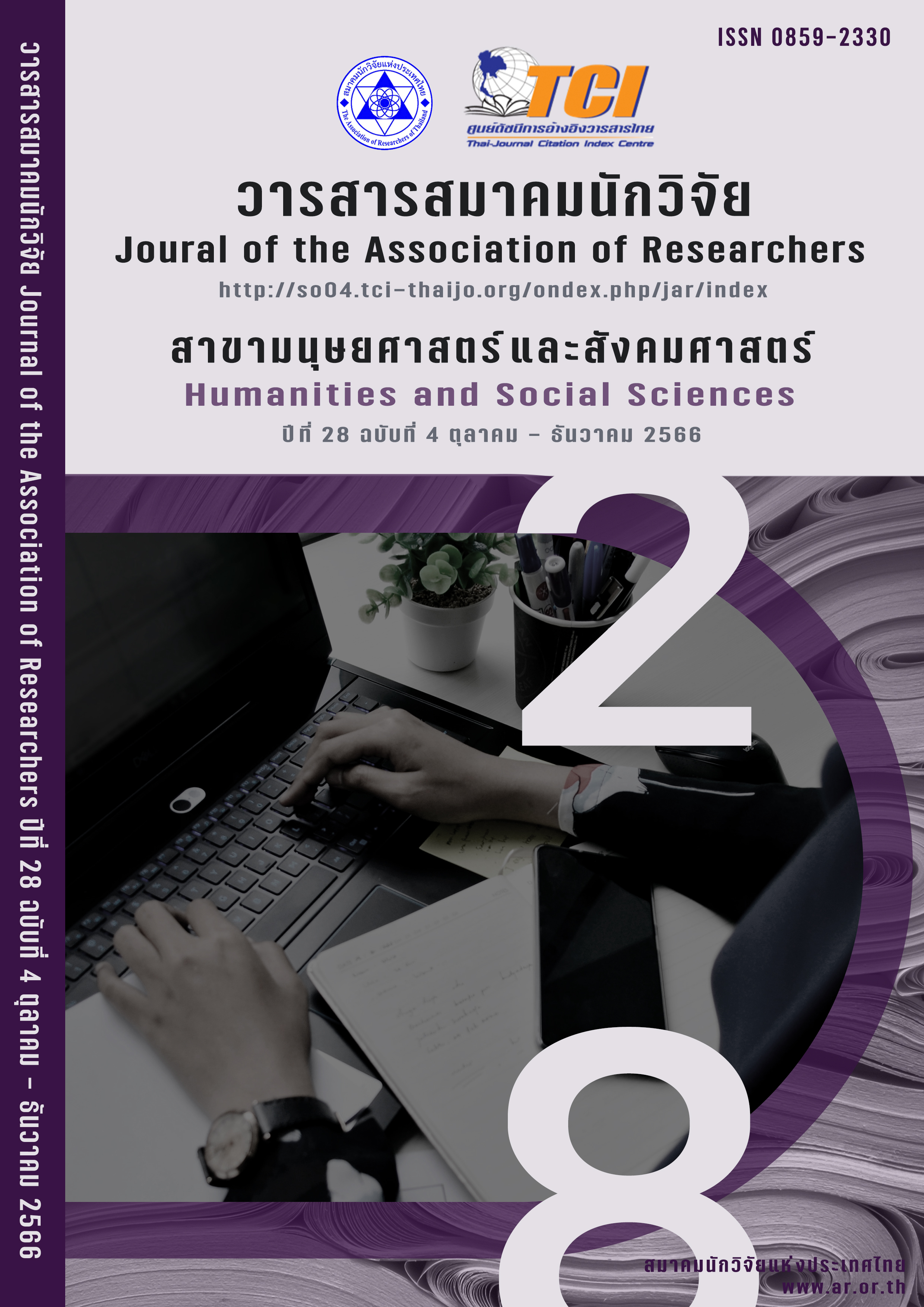A Study of Problems in Teaching - Learning Management of Teachers in the Digital Era. Under Nakhon Sawan Primary Educational Service Area, Office 1
Main Article Content
Abstract
The purposes of this research article are 1) to study problems in teaching and learning management for teachers in the digital age under the Nakhon Sawan Primary Educational Service Area Office, Area 1 2) to study and find guidelines for studying problems in organizing teaching and learning for teachers. In the digital age, under the jurisdiction of the Nakhon Sawan Primary Educational Service Area Office, Area 1, data is collected by Interviews with 6 experts, questionnaires of 291 school administrators and teachers. The instrument was an interview form. Questionnaires and assessments use statistics, frequency, percentage, mean, standard deviation and content analysis. The results of the research found that: 1) The value of necessary needs in the study of problems in organizing teaching and learning for teachers in the digital age. Overall, it was found that the learner side in the digital age had the highest value of necessary needs, followed by the teacher side. digital age Technology and innovation in the digital age and learning in the digital age respectively, and 2) guidelines for studying problems in teaching and learning for teachers in the digital age. Learners in the digital age Learners should develop the ability to seek answers and new knowledge on their own by using various digital methods. and can exchange knowledge gained among friends Teachers in the digital age Teachers should develop themselves to keep up with changes and create learning innovations. and being a person of morality and ethics in technology and innovation in the digital age Executives should allocate budget to develop the information technology system to be efficient. and learning in the digital age Educational personnel should organize learning that emphasizes analytical thinking. and teamwork
Article Details

This work is licensed under a Creative Commons Attribution-NonCommercial-NoDerivatives 4.0 International License.
บทความที่ปรากฏในวารสารนี้ เป็นความรับผิดชอบของผู้เขียน ซึ่งสมาคมนักวิจัยไม่จำเป็นต้องเห็นด้วยเสมอไป การนำเสนอผลงานวิจัยและบทความในวารสารนี้ไปเผยแพร่สามารถกระทำได้ โดยระบุแหล่งอ้างอิงจาก "วารสารสมาคมนักวิจัย"
References
กระทรวงศึกษาธิการ. (2545). พระราชบัญญัติการศึกษาแห่งชาติ พุทธศักราช 2542 (ฉบับที่ 2) และที่แก้ไขเพิ่มเติมพุทธศักราช 2545. กรุงเทพมหานคร. บริษัทสยามสปอรต์ ซินดิ เค จำกัด.
กิติยวดี บุญซื่อ. (2546). รายงานการสังเคราะห์รูปแบบการพัฒนาครูทั้งโรงเรียน : โรงเรียนในโครงการโรงเรียนปฏิรูปการเรียนรู้เพื่อพัฒนาคุณภาพผู้เรียน. กรุงเทพมหานคร. พิมพ์ ดีการพิมพ์.
ไกรยส ภัทราวาท. (2559). ติดอาวุธครู สร้างห้องเรียน 4.0. กรุงเทพมหานคร : กรุงเทพธุรกิจ.
พฤทธิ์ ศิริบรรณพิทักษ์. (ม.ป.ป.). กระบวนทัศน์ใหม่ของการบริหารการศึกษา. เรียกใช้เมื่อ 16 มกราคม 2564 สืบค้นจาก https://www.sammajivasil.net/news11.htm
วสันต์ ปานทอง และคณะ. (2556). “รูปแบบการพัฒนาครูเพื่อศิษย์ในสถานศึกษา สังกัด สำนักงานเขตพื้นที่การศึกษาประถมศึกษา”. วารสารศึกษาศาสตร์ มหาวิทยาลัยนเรศวร, 15 (ฉบับพิเศษ), 193-205.
วิชัย วงศ์ใหญ่ และ มารุต พัฒผล. (2562). Disruptive Teacher : ครูผู้ทำลายล้างการสอนแบบเดิม ๆ. กรุงเทพมหานคร. ศูนย์ผู้นำนวัตกรรมหลักสูตรและการเรียนรู้.
สำนักงานคณะกรรมการพัฒนาการเศรษฐกิจและสังคมแห่งชาติ. (2559). แผนพัฒนาเศรษฐกิจและสังคมแห่งชาติ ฉบับที่ 12 (พ.ศ. 2560 - 2564). กรุงเทพมหานคร. สำนักนายกรัฐมนตรี.
สุนันท์ สีพาย. (2562). บทบาทของครูไทยในการศึกษา 4.0. วารสารการวัดผลการศึกษา มหาวิทยาลัยนเรศวร, 25(2), 3-14.
สุนันท์ สีพาย และ ไพฑูรย์ สินลารัตน์. (2561). เปลี่ยนผ่านการศึกษาไทยสู่การศึกษา 4.0. วารสารการวัดผลการศึกษา มหาวิทยาลัยนเรศวร, 24(2), 13-27.
สุมน อมรวิวัฒน์. (2546). ปรัชญาและแนวคิดของการพัฒนาครูและเครือข่าย. สานปฏิรูป, 6(65), 79-80.
อริญญา เถลิงศรี. (2561). Disruption: ทำลายล้างหรือสร้างโอกาส. เรียกใช้เมื่อ 10 มกราคม 2564 สืบค้นจาก https://www.trueplookpanya.com/ knowledge/content/52232/- edu-teaartedu-teaart- teaartdir.
Knowles, M. S. (1975). Self-directed Learning: A Guide for Learners and Teachers. New York: Cambridge Book.
Mezirow, J. (1991). Transformative Dimensions of Adult Learning. San Francisco, CA: Jossey- Bass.
Reimers, E.V. (2003). Teacher Professional Development: An International Review of theLiterature. Paris: International Institute for Educational Planning.
Sparks, D., & Loucks-Horsley, S. (1989). Five models of staff development for teachers. Journal of Staff Development, 10(4), 40–57.
Taylor, K., Marienau, C., & Fiddler, M. (2000). Developing adult learners: Strategies for teachers and trainers. San Francisco: Jossey-Bass Inc., Publishers. 59- 66.
Ubben, G.C., Hughes, L.W., & Norris, C.J. (2001). The principal: creative leadership for effective School. Boston: Allyn & Bacon.
Translate in Thai Reference
Amornwiwat. S. (2003). Philosophy and concepts of teacher development and networks, Reform Reform, 6(65),79-80.
Bunsue K. (2003). Figure synthesis report. Whole school teacher development model: Schools in the Learning Reform School Project to Develop Student Quality, Bangkok: Pim Deekarn.
Ministry of Education. (2002). National Education Act, B.E. 2542 (No. 2) and the additional amendments B.E. 2002. Bangkok: Siam Sport Sindi K Company Limited.
Office of the National Economic and Social Development Board. (2016). Economic development plan and National Society, Issue 12 (2017-2021). Bangkok: Office of the Prime Minister.
Panthong W. et al. (2013). “Teacher development model for students in educational institutions under the Office of the Primary Educational Service Area” Education Journal Naresuan University, 15(ed Special), 193-205.
Phattharawat. K. (2016). Arming teachers to create classrooms 4.0. Bangkok: Krungthep.
Prutsiribannapitak. T. (M.P.P.). A new paradigm of educational administration, retrieved when 16 January 2021 from https://www.sammajivasil.net/news11.htm.
Sipai.S. (2019). The role of Thai teachers in Education 4.0. Journal of Educational Measurement Naresuan University, 25(2), 3-14.
Sipai S.& Sinlarat.P. (2018). Transitioning Thai education towards Education 4.0. Journal of Educational measures Naresuan University, 24(2), 13-27.
Thalerngsri. A. (2018). Disruption: Destruction or creating opportunities. Retrieved 10 January 2021 from https://www.trueplookpanya.com/knowledge/content/ 52232/-edu-teaartedu-teaart- teaartdir.
Wongyai W. & Phatphon. M. (2019). Disruptive Teacher: The teacher who destroys teaching.Traditional style. Bangkok: Curriculum and Learning Innovation Leadership Center.


